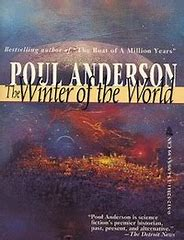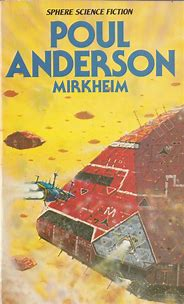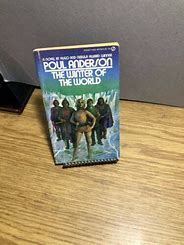We have discussed fictional languages in Poul Anderson's works. Should some of the dialogue in screen adaptations be spoken in Temporal, Planha, Eriau, Anglic etc with subtitles? Dennitzan zmayi/ychani speak archaic Eriau. Thus, there is plenty of scope for linguistic creativity and inventiveness. The question becomes even more sharply focused in Anderson's
The Winter Of The World. When Donya addresses
her family in Kursovikian, Josserek understands the first sentence and a half but then she becomes unintelligible:
"Yes, I've read, I've been told, the man from Killimaraich remembered, kindred here make their own slang, generation by generation till a private dialect has turned into an entire language never shared with those who are not of the blood." (XV, p. 129)
In a film, even if Donya began speaking, for our benefit, in English, she would have to lapse into something else without subtitles because viewpoint character Josserek does not understand it.
For most of us, languages are just a means of communication but, for an older philosophical tradition, they meant something more. CS Lewis, friend of Tolkien, wrote a novel in which Ransom tells his friend, Dimble, to address Merlin in the Great Tongue, telling him that he, Dimble, comes:
"'...in the name of God and all angels and in the power of the planets from one who sits today in the seat of the Pendragon...'"
-CS Lewis, That Hideous Strength IN Lewis, The Cosmic Trilogy (London, 1990), pp. 349-753 AT CHAPTER 10, p. 587.
When Dimble rehearses this speech in Old Solar:
he raises his head;
syllables sounding like castles come from his mouth;
the viewpoint character's heart leaps and quivers;
the room becomes intensely quiet;
animals present become still and stare at the speaker;
the voice does not sound like Dimble's;
it is as if the words speak themselves through him from a strong, distant place;
as if they are "...present operations of God, the planets, and the Pendragon..." (ibid.);
this is "..the language spoken before the Fall and beyond the Moon..." (ibid.);
the meanings are nor arbitrary but inherent.
"This was Language herself, as she first sprang at Maleldil's bidding out of the molten quicksilver of the star called Mercury on Earth, but Viritrilbia in Deep Heaven." (ibid.)
Afterwards, domesticity returns.
Could that be presented on film? Yes, someone could try to do it. We might not quite hear the sounds that Dimble utters.
As a materialist, I believe that languages are social interactions between psychophysical organisms. As a Platonist, Lewis believed that language was an Idea before it was instantiated in particular languages. But how can a meaning be inherent in a sound?
Lewis presents an interesting insight into a particular world view. Anderson shows us languages as we know them developing in the future.









